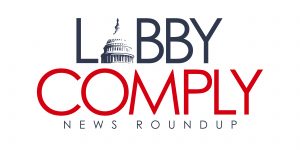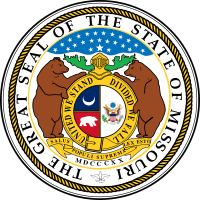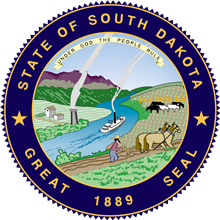November 12, 2018 •
Monday’s LobbyComply News Roundup
Campaign Finance National: Corporate PACs Try to Rebuild Their Reputations After Midterms by Lorraine Woellert for Politico Elections National: In ‘Rainbow Wave,’ LGBT Candidates Are Elected in Record Numbers by Christina Caron (New York Times) for WRAL North Carolina: Details […]
 Campaign Finance
Campaign Finance
National: Corporate PACs Try to Rebuild Their Reputations After Midterms by Lorraine Woellert for Politico
Elections
National: In ‘Rainbow Wave,’ LGBT Candidates Are Elected in Record Numbers by Christina Caron (New York Times) for WRAL
North Carolina: Details of NC’s New Voter ID Requirement Still Need to Be Worked Out by Sarah Krueger for WRAL
Ethics
National: Ex-Congressman Sentenced to 10 Years for Stealing Charitable Donations by Matt Stevens (New York Times) for WRAL
New York: Eric Schneiderman Won’t Face Criminal Charges Over Allegations of Abuse by Camila Domonoske for National Public Radio
Oklahoma: Oklahoma Watch: Governor-elect Kevin Stitt’s business ties could cause conflicts of interest by Paul Monies (Oklahoma Watch) for Tulsa World
Lobbying
National: House Democrats’ Win Fuels K Street Hiring by Theodoric Meyer and Marianne Levine for Politico
Florida: Miami Tells Officials Not to Talk to Beckham Team Until Ethics Complaint Is Resolved by Joey Flechas for Miami Herald
November 9, 2018 •
News You Can Use – November 9, 2018
National: Forget the Russians. On This Election Day, It’s Americans Peddling Disinformation and Hate Speech. Washington Post – Craig Timberg and Tony Romm | Published: 11/6/2018 Even as Silicon Valley has become more aggressive in battling foreign efforts to influence […]

National:
Forget the Russians. On This Election Day, It’s Americans Peddling Disinformation and Hate Speech.
Washington Post – Craig Timberg and Tony Romm | Published: 11/6/2018
Even as Silicon Valley has become more aggressive in battling foreign efforts to influence U.S. politics, it is losing innumerable cat-and-mouse games with Americans who are eagerly deploying the same techniques used by the Russians in 2016. Experts point to a rampant online spread of misleading reports and images about the migrant caravan in Mexico, for example – and especially the demonstrably false allegations that billionaire George Soros is funding a violent “invasion” of the United States. Accounts controlled by Russians probably helped amplify such misleading narratives, but the evidence so far is they started with American political activists who are increasingly adept at online manipulation techniques but enjoy broad free-speech protections that tech companies have been reluctant to challenge.
Industries Turn Freedom of Information Requests on Their Critics
WRAL – Elizabeth Williamson | Published: 11/5/2018
Dennis Ventry Jr., a law professor at the University of California, Davis, drew the ire of tax preparation companies by criticizing a deal they have to provide a free tax filing service through the IRS. The companies promptly hit back with a tactic that corporations, lobbyists, and interest groups are increasingly using against academic researchers: their trade coalition filed a public records request with the university seeking everything Ventry had written or said about the companies this year, including emails, text messages, voice mails, and hand-jotted notes. It was just one example of how both state-level public records laws and the Freedom of Information Act, written to ensure transparency and accountability in government, have morphed into potent weapons in legal and business disputes, raising questions about the chilling effects, and cost, they impose on targets who are doing research in controversial or sensitive fields.
Federal:
Anyone Can Make a Super PAC – Even Prisoners and Kids Who Can’t Vote
Center for Responsive Politics – Kaitlin Washburn | Published: 11/1/2018
Super PACs wield massive financial power and influence in elections. Just this cycle alone, super PACs registered with the FEC have received over $1.3 billion and have spent $695 million. And by following a few simple steps, most anyone can own a super PAC. The Center for Responsive Politics identified eight super PACs created by people who cannot participate in elections. Some of them were started by teenagers who cannot vote, while others were formed by people in prison.
Far-Right Internet Groups Listen for Trump’s Approval, and Often Hear It
MSN – Kevin Roose and Ali Winston (New York Times) | Published: 11/4/2018
As President Trump waged a fear-based campaign to drive Republican voters to the polls for the midterm elections, far-right internet communities have been buoyed as their once-fringe views have been given oxygen by Republicans. These radical communities have entered into a sort of imagined dialogue with the president. They create and disseminate slogans and graphics and celebrate when they show up in Trump’s Twitter feed days or weeks later. They carefully dissect his statements, looking for hints of their influence. And when they find those clues, they take them as evidence that Trump is “/ourguy/,” a label for people internet extremists believe share their views, but who are unable to say so directly in public.
Lobbyists Hit Campaign Trail to Help Old Bosses, Earn ‘a Little Bit of Currency’
Politico – Theodoric Meyer | Published: 11/3/2018
Members of Congress received help before Election Day from a tiny but influential subset of on-the-ground volunteers: Washington D.C. lobbyists eager to help their old bosses, and perhaps their own careers. Lobbyists fanned out across the country to knock on doors for favored candidates, nearly a dozen of them said in interviews and emails. Building relationships with lawmakers and their staffs is crucial to success on K Street and spending a couple of days knocking on doors is one way to strengthen that bond. Some in the industry also remain close to old bosses on Capitol Hill or just want to get out of Washington and dabble in campaigning for a few days.
Sessions’s Ouster Throws Future of Special Counsel Probe into Question
MSN – Rosalind Helderman, Matt Zapotosky, and Carol Leonnig (Washington Post) | Published: 11/7/2018
Attorney General Jeff Sessions resigned at the request of President Trump, causing uncertainty in the investigation of Russian interference in the 2016 election. Trump named as acting attorney general Matthew Whitaker, Sessions’ chief of staff. A Justice Department official said Whitaker would assume final decision-making authority over special counsel Robert Mueller’s probe. As a legal commentator, Whitaker has said Mueller appeared to be taking his investigation too far. There were immediate calls by Democrats and watchdogs for Whitaker to recuse himself. Democrats, emboldened by winning control of the U.S. House, also promised to investigate Sessions’ forced resignation and suggested Trump’s actions could amount to obstruction of justice if he intended to disrupt the criminal inquiry.
Three Candidates Indicted on Felony Fraud Charges Survive Midterms. One Just Barely.
Washington Post – Meagan Flynn | Published: 11/7/2018
Three Republican candidates facing an assortment of corruption charges appeared to squeak past their Democratic opponents to hang onto their jobs. They include U.S. Rep. Duncan Hunter, indicted on charges of wire fraud and accusations he funded a luxurious lifestyle with campaign donations; U.S. Rep. Chris Collins, indicted on insider trading charges; and Texas Attorney General Ken Paxton. indicted on felony securities fraud charges in state court, accused of lying to friends and potential investors about his financial stake in a technology company. Despite the close races in solid-red territory, their apparent victories highlight the polarizing political climate in which criminal investigations into elected officials are frequently met with more sympathy among supporters than scorn.
White House Shares Doctored Video to Support Punishment of Journalist Jim Acosta
MSN – Drew Harwell (Washington Post) | Published: 11/8/2018
CNN’s Jim Acosta had his White House press credentials revoked, with the Trump administration claiming he manhandled a female intern. During a press conference, Acosta got into a spat with the president and persisted in asking questions, and a female intern tried to take his microphone away from him. White House Press Secretary Sarah Sanders posted an edited video of the incident where the action is generally slowed down but speeds up right before the moment of contact to create the false impression of a deliberate jab on the part of Acosta. The event highlighted how video content, seen as a verification tool for truth and confirmation, has become as vulnerable to political distortion as anything else.
From the States and Municipalities:
Florida: Before Going to Prison, Former Opa-locka Commissioner Worked on Political Campaigns
Miami Herald – Jay Weaver and Maya Kaufman | Published: 11/6/2018
Before he surrendered to a correctional facility, former Opa-locka City Commissioner Luis Santiago – who pleaded guilty to pocketing thousands of dollars in bribes – spent the fall election season working as a campaign aide for John Riley, an Opa-locka commissioner running for mayor, and other candidates on the November 6 ballot. Riley said he had no qualms about hiring Santiago as a part-time campaign worker, despite his pleading guilty to extorting money from Opa-locka businesses seeking city permits and contracts. “It kept his mind busy and gave him a sense of purpose,” Riley said. “It’s depressing knowing that you’re going to be facing prison.”
Missouri: Amendment 1: Voters strongly support Clean Missouri redistricting plan, ethics reform
Columbia Missourian – David Reynolds, Thomas Oide, and Tessa Weinberg | Published: 11/6/2018
Amendment 1 was approved by Missouri voters. It bans all lobbyist gifts in the General Assembly worth more than five dollars and requires politicians to wait at least two years after the conclusion of the legislative session in which they last served before becoming lobbyists. Amendment 1 also lowers the $2,600 campaign contribution limit for state legislative candidates and requires legislative records to be subject to the state’s open records law. The amendment’s changes to the redistricting process have caused the most controversy. A nonpartisan state demographer will be tasked with drawing the districts and a bipartisan commission will review the results.
New York: Lobbyist Arrested, Accused of Bribing State Legislator
Rochester Democrat and Chronicle – Gary Craig | Published: 11/1/2018
Albany-based lobbyist Robert Scott Gaddy faces federal charges for offering to pay a bribe during an investigation that already includes the arrest of New York Assemblyperson Joseph Errigo. Gaddy’s arrest grew out of an FBI investigation into fraud and corruption in a redevelopment project in Rochester. Federal authorities say that while investigating the project, agents learned of possible criminal conduct by Gaddy. A person working with the FBI allegedly approached Gaddy about paying a bribe to a member of the Assembly. “Yeah … yeah, no problem,” Gaddy responded, according to the FBI. Authorities alleged Errigo took money from a lobbyist to introduce legislation designed to stop the project.
North Dakota: Aimed at Combating Corruption, North Dakota Voters Pass Measure 1
Dickinson Press – Tu-Uyen Tran | Published: 11/6/2018
Voters in North Dakota approved Measure 1 on the November 6 ballot. It will, among other provisions, require the Legislature to pass laws requiring the disclosure of the “ultimate and true source” of money spent on media to influence campaigns, ban lobbyists from giving gifts to public officials, prohibit politicians from using campaign funds for personal purposes, and create a state ethics commission to investigate violations.
South Dakota: Out-Of-State Initiative Money Ban Likely to Face Challenge
Rapid City Journal – James Nord (Associated Press) | Published: 11/7/2018
South Dakota’s first-in-the-nation law that bans out-of-state money from ballot question campaigns faces an uncertain future, with critics saying it is likely to be challenged in court. The U.S. Supreme Court has interpreted the Constitution’s free-speech protections as prohibiting any limitations on money in ballot measure elections, Paul S. Ryan, vice president of policy and litigation at Common Cause, has said. The high court has said contributions to candidates can be limited to prevent the corruption of public officials. At least two states, Alaska and Hawaii, restrict out-of-state donations to candidates, but Alaska’s limits face a court challenge.
November 7, 2018 •
San Diego Passes Restrictions on City Officials
City of San Diego voters approved Measure L to limit lobbying and campaign activities of elected city officers. The measure increases the restriction on lobbying by former city officials from one to two years. The measure also eliminates the city […]
 City of San Diego voters approved Measure L to limit lobbying and campaign activities of elected city officers.
City of San Diego voters approved Measure L to limit lobbying and campaign activities of elected city officers.
The measure increases the restriction on lobbying by former city officials from one to two years.
The measure also eliminates the city elective officer exception to receiving honoraria prohibited by state law.
November 7, 2018 •
Long Beach California Votes to Create an Ethics Commission
The City of Long Beach, California voted to establish a city ethics commission. Measure CCC creates an independent ethics commission charged with administering and implementing rules concerning campaign financing, lobbying, conflicts of interest and governmental ethics. The commission will also […]
 The City of Long Beach, California voted to establish a city ethics commission.
The City of Long Beach, California voted to establish a city ethics commission.
Measure CCC creates an independent ethics commission charged with administering and implementing rules concerning campaign financing, lobbying, conflicts of interest and governmental ethics.
The commission will also develop an educational program for candidates and lobbyists with the city.
The city’s agreement with the Fair Political Practices Commission to assist in the enforcement of local ethics laws remains in place.
November 7, 2018 •
Phoenix Passes Amendment Requiring Dark Money Disclosure
Voters in Phoenix overwhelmingly passed Proposition 419, an amendment to the Charter of the City of Phoenix requiring any person, association of persons or entity making expenditures to influence the result of a city election to disclose and identify expenditures […]
 Voters in Phoenix overwhelmingly passed Proposition 419, an amendment to the Charter of the City of Phoenix requiring any person, association of persons or entity making expenditures to influence the result of a city election to disclose and identify expenditures and contributions including original and intermediary sources of major contributions.
Voters in Phoenix overwhelmingly passed Proposition 419, an amendment to the Charter of the City of Phoenix requiring any person, association of persons or entity making expenditures to influence the result of a city election to disclose and identify expenditures and contributions including original and intermediary sources of major contributions.
This is the latest in a nationwide trend to limit the influence of so-called dark money.
Proponents for the proposition argued Proposition 419 was a critical step to restoring the public’s trust in our elections.
The proposition passed 86.1 percent to 13.89 percent.
November 7, 2018 •
North Dakota Votes to Create an Ethics Commission
North Dakota Voters passed a constitutional measure to establish an ethics commission. Initiated Constitutional Measure 1 addresses the transparency of funding sources, lobbyists, conflicts of interests, and the establishment of an ethics commission. The measure further restricts lobbyists ability to […]
 North Dakota Voters passed a constitutional measure to establish an ethics commission.
North Dakota Voters passed a constitutional measure to establish an ethics commission.
Initiated Constitutional Measure 1 addresses the transparency of funding sources, lobbyists, conflicts of interests, and the establishment of an ethics commission.
The measure further restricts lobbyists ability to give gifts and campaign contributions.
The legislative assembly is directed to pass laws that provide electronically accessible public disclosure of funding that attempts to influence state-wide elections and ballot measures.
November 7, 2018 •
Florida Passes Revolving Door Ban
Voters approved Amendment 12, titled Lobbying and Abuse of Office by Public Officers. The amendment expands restrictions on lobbying for compensation by former public officers, former justices, and judges. Effective December 31, 2022 the measure bans state and local officials […]
Voters approved Amendment 12, titled Lobbying and Abuse of Office by Public Officers.
The amendment expands restrictions on lobbying for compensation by former public officers, former justices, and judges.
Effective December 31, 2022 the measure bans state and local officials from lobbying for a period of six years after leaving public office.
The prohibition includes individuals serving as a statewide elected officer, member of the Legislature, a county commissioner, school superintendent or board member, elected municipal officer, and the agency head of an executive branch department of the state government.
The measure also prohibits abuse of a public position to obtain a personal benefit.
The Legislature will establish penalties for violations of the prohibition against abuse of a public position to take effect December 31, 2020.
November 7, 2018 •
Missouri Amendment 1 Passes, limiting lobbying, campaign contribution laws
Nearly 62 percent of Missourians voted in favor of Amendment 1, placing tighter restrictions on lobbying and campaign contributions. Amendment 1 will prohibit former state legislators and Missouri General Assembly members from becoming paid lobbyists for a period of two […]
 Nearly 62 percent of Missourians voted in favor of Amendment 1, placing tighter restrictions on lobbying and campaign contributions.
Nearly 62 percent of Missourians voted in favor of Amendment 1, placing tighter restrictions on lobbying and campaign contributions.
Amendment 1 will prohibit former state legislators and Missouri General Assembly members from becoming paid lobbyists for a period of two years instead of six months, set a $5 limit on meals and other lobbyist gifts to legislators, and open legislators’ emails to public records requests.
Political candidates and their campaign committees also face more strict contribution limits: $2,500 for a state senator and $2,000 for a state representative.
The measure will become state law once the election results are certified later this year.
November 7, 2018 •
South Dakota Passes Measure to Ban Out of State Donations but Defeats Campaign Finance Constitutional Amendment
South Dakota voters did not pass a constitutional amendment to create a campaign finance and government accountability board but passed a measure to ban out of state donations on ballot questions. Amendment W would have had the power to regulate […]
 South Dakota voters did not pass a constitutional amendment to create a campaign finance and government accountability board but passed a measure to ban out of state donations on ballot questions.
South Dakota voters did not pass a constitutional amendment to create a campaign finance and government accountability board but passed a measure to ban out of state donations on ballot questions.
Amendment W would have had the power to regulate campaign finance and lobbying laws and create a government accountability board. The measure failed by a margin of 45 percent in favor with 55 percent against.
Initiated Measure 24 bans out of state campaign donations for ballot question committees by nonresidents, out of state political committees and other groups not filed with the Secretary of State. The measure passed by a margin of 56 percent in favor and 44 percent against.
South Dakota Attorney General Marty Jackley predicts that passage of Initiated Measure 24 may be challenged as an unconstitutional violation of free speech and ultimately a financial burden to tax payers.
November 7, 2018 •
New Mexico Voters Approve of State Ethics Commission
New Mexico voters approved a constitutional amendment to Article 5 of the state’s constitution. Constitutional Amendment 2 creates an independent ethics commission with jurisdiction to investigate, adjudicate and issue advisory opinions concerning civil violations of laws governing ethics, standards of […]
 New Mexico voters approved a constitutional amendment to Article 5 of the state’s constitution.
New Mexico voters approved a constitutional amendment to Article 5 of the state’s constitution.
Constitutional Amendment 2 creates an independent ethics commission with jurisdiction to investigate, adjudicate and issue advisory opinions concerning civil violations of laws governing ethics, standards of conduct and reporting requirements.
The commission will have jurisdiction over state officers and employees of the executive and legislative branches, lobbyists, and seekers or holders of government contracts.
In order to be a functional commission the Legislature must pass laws granting the commission all of its powers and duties.
November 7, 2018 •
Wednesday’s LobbyComply News Roundup
Campaign Finance Federal: “House Dem Candidates Snag Free Office Rent” by Scott Bland for Politico Canada: “Alberta Tables Bill Proposing Changes to Municipal Elections” by Charles Lefebvre for Chat News Today Alaska: “As Alaska’s Elections Come Down to Wire, Ads […]
 Campaign Finance
Campaign Finance
Federal: “House Dem Candidates Snag Free Office Rent” by Scott Bland for Politico
Canada: “Alberta Tables Bill Proposing Changes to Municipal Elections” by Charles Lefebvre for Chat News Today
Alaska: “As Alaska’s Elections Come Down to Wire, Ads Test Limits of Campaign Finance Laws” by Zachariah Hughes for Alaska Public Media
Elections
National: “Forget the Russians. On This Election Day, It’s Americans Peddling Disinformation and Hate Speech.” by Craig Timnberg and Tony Romm for Washington Post
Florida: “Before Going to Prison, Former Opa-locka Commissioner Worked on Political Campaigns” by Jay Weaver and Maya Kaufman for Miami Herald
Ethics
Federal: “Newly Released Emails Suggest Zinke Contradicted Ethics Pledge” by Juliet Eilperin (Washington Post) for MSN
Federal: “China Greenlights Large Batch of Ivanka Trump Trademark Applications” by Gary Shih for Washington Post
Lobbying
National: “Industries Turn Freedom of Information Requests on Their Critics” by Elizabeth Williamson for WRAL
November 6, 2018 •
Tuesday’s LobbyComply News Roundup
Ethics National: “Far-Right Internet Groups Listen for Trump’s Approval, and Often Hear It” by Kevin Roose and Ali Winston for MSN National: “Supreme Court Allows Trial on Census Citizenship Question to Go Forward” by Robert Barnes (Washington Post) for Chicago […]
 Ethics
Ethics
National: “Far-Right Internet Groups Listen for Trump’s Approval, and Often Hear It” by Kevin Roose and Ali Winston for MSN
National: “Supreme Court Allows Trial on Census Citizenship Question to Go Forward” by Robert Barnes (Washington Post) for Chicago Tribune
National: “Next-in-Line Mueller Supervisor Got White House Ethics Waiver in April” by Darren Samuelsohn for Politico
National: “Judge Denies Trump Request to Stay Emoluments Suit, Could Allow Plaintiffs to Seek Details on Hotel’s Foreign Customers” by Jonathan O’Connell, Anne Marimow, and David Fahrenthold (Washington Post) for Chicago Tribune
Missouri: “As Sanders Heads to Prison, a Political Rival Files Suit Accusing Him of Dirty Tricks” by Mike Hendricks for Kansas City Star
Legislative Issues
National: “Laws and Disorder” by Paul Kane (Washington Post) and Derek Willis for ProPublica
Lobbying
National: “Lobbyists Hit Campaign Trail to Help Old Bosses, Earn ‘a Little Bit of Currency’” by Theodoric Meyer for Politico
National: “Almost Two Years into Trump Presidency, Pentagon’s Revolving Door Still Spins” by Aaron Gregg for Washington Post
November 5, 2018 •
Anne Arundel County Ethics Bill Signed by County Executive
On October 15, 2018, the Anne Arundel County Council passed a public ethics bill originally proposed by County Executive Steve Schuh. Bill No. 80-18 increases late filing fees for lobbyists and employees, adds a revolving door provision, modifies certain definitions, […]
 On October 15, 2018, the Anne Arundel County Council passed a public ethics bill originally proposed by County Executive Steve Schuh.
On October 15, 2018, the Anne Arundel County Council passed a public ethics bill originally proposed by County Executive Steve Schuh.
Bill No. 80-18 increases late filing fees for lobbyists and employees, adds a revolving door provision, modifies certain definitions, requires employee ethics training, and creates changes to comply with state ethics laws, among other provisions.
The bill also updates who is required to file financial disclosure statements.
The bill was signed by Schuh and will be effective on December 6, 2018.
November 5, 2018 •
Monday’s LobbyComply News Roundup
Campaign Finance Federal: “Anyone Can Make a Super PAC – Even Prisoners and Kids Who Can’t Vote” by Kaitlin Washburn for Center for Responsive Politics Elections Federal: “In Email to Trump’s Campaign Strategist, Roger Stone Implied He Knew of WikiLeaks’s […]
 Campaign Finance
Campaign Finance
Federal: “Anyone Can Make a Super PAC – Even Prisoners and Kids Who Can’t Vote” by Kaitlin Washburn for Center for Responsive Politics
Elections
Federal: “In Email to Trump’s Campaign Strategist, Roger Stone Implied He Knew of WikiLeaks’s Plans” by Sharon LaFraniere, Michael Schmidt, Maggie Haberman, and Danny Hakim (New York Times) for MSN
Ethics
Connecticut: “Judge Rules UConn Did Not Violate Ethics Law in Hiring Football Coach Randy Edsall’s Son” by Dave Altimeri for Hartford Courant
Nebraska: “UNL Professor Files Ethics Complaint, Alleging Fortenberry’s Chief of Staff Threatened Him Over Facebook Post” by Joseph Morton for Omaha World-Herald
Lobbying
Canada: “Senators Are Being Lobbied More Than Ever – And Some Are Feeling Overwhelmed” by John Paul Tasker for CBC
New York: “Lobbyist Arrested, Accused of Bribing State Legislator” by Gary Craig for Rochester Democrat and Chronicle
State and Federal Communications, Inc. provides research and consulting services for government relations professionals on lobbying laws, procurement lobbying laws, political contribution laws in the United States and Canada. Learn more by visiting stateandfed.com.

